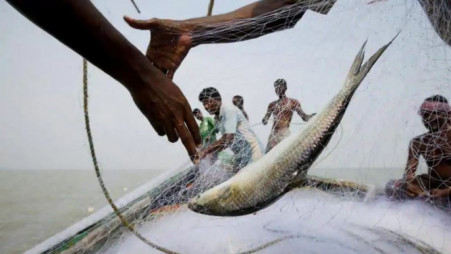Delicious hilsa slips from table to luxury list
A stroll through Dhaka’s bustling kitchen markets paints a stark picture: river fish are almost vanishing from the shelves, a consequence of the government’s ongoing fishing ban designed to preserve the species

Once a weekly staple, the prized national fish hilsa has now become a luxury for many, with its price surging by nearly 50% over the past year amid rising market costs.
A recent survey by the Bangladesh Trade and Tariff Commission (BTTC) revealed that between August and September alone, hilsa prices surged by Tk200–500 per kilogramme, with large specimens sometimes fetching an astonishing Tk1,000 increase.
Last August, a 1.5 kg hilsa sold for a maximum of Tk2,000 per kg; by 2025, the same fish now commands Tk3,000, reflecting a sharp 50% spike in just twelve months.
A stroll through Dhaka's bustling kitchen markets paints a stark picture: river fish are almost vanishing from the shelves, a consequence of the government's ongoing fishing ban designed to preserve the species.
Locally caught fish such as 'rui', 'katla', 'koi' and 'shing' have filled the gap, but at significantly higher prices.
For shoppers, the joy of seeing hilsa in the market is often tempered by sticker shock.
"Just before the ban, buyers rush to stock hilsa, and that automatically pushes up the price," explained Enamul, a fish trader at Shantinagar kitchen market.
Another vendor at Karwan Bazar pointed out that wholesale prices have surged, forcing retailers to raise rates, even though supply has not been disrupted.
For consumers, however, the once-affordable fish has become almost unattainable.
"A decade ago, big hilsa were sold in pairs for under Tk2,000. Now, buying just one costs at least Tk5,000," lamented Mohibur Rahman.
Shoppers like Arif Hossain also voice frustration at the paradox of the fishing ban.
"Fishing, transportation, and marketing of hilsa are banned for 22 days every year. The government says it helps increase production. If production rises, prices should logically go down — but that never happens. In fact, hilsa prices skyrocket during the first week after the ban is lifted," he said.
Middle-class families, who once relished the aroma of freshly fried hilsa on weekend afternoons, now have to compromise.
"Hilsa is our national fish, and its price should be affordable for everyone. But it's being sold at exorbitant rates. For middle-class families, buying hilsa has become a luxury," said Shagufta Akter Lipi.
Many households have resorted to cheaper alternatives to meet their protein needs.
Yet despite the soaring prices, the real beneficiaries — fishermen — see little gain. In Bhola, the country's largest hilsa-producing district, most fishermen rely on leased boats and advance loans from wholesalers, locally known as dadon. They are often compelled to sell their catch at fixed rates, leaving minimal profit.
"Our share is tiny. After repaying the dadon money, nothing much remains," said veteran fisherman Khalek Majhi.
The BTTC study highlights the convoluted journey of hilsa from river to table. Typically, the fish changes hands five times—fishermen, landing stations, wholesalers, commission agents, retailers and finally, buyers.
While fishermen might earn only Tk800 per kg for large hilsa, the same fish reaches Dhaka markets at Tk3,000, reflecting a huge markup driven by multiple intermediaries.
The study breaks down the costs further: fishing expenses range from Tk470–500 per kg, resale margins often add Tk1,000, and additional costs include Tk75 for wholesale-to-retail transfers, Tk150 from retail to consumer, and commissions exceeding 10% in some cases.
Syndicate practices, including cold storage stockpiling, further fuel price spikes.
"Hilsa prices naturally rise by over 60-70% just due to multiple handovers, and syndicate manipulation makes it worse," noted Sabbir Hossain Khan, an agricultural economist and PhD researcher at Tokyo University of Agriculture.
To tame these soaring prices and ensure fair returns for fishermen, the BTTC has recommended reducing the number of middlemen.
Proposals include empowering fishermen's cooperatives or establishing government marketing outlets to supply hilsa directly during peak season, offering hope that the nation's cherished fish could one day grace the dinner table without burning holes in pockets.



 Keep updated, follow The Business Standard's Google news channel
Keep updated, follow The Business Standard's Google news channel



















